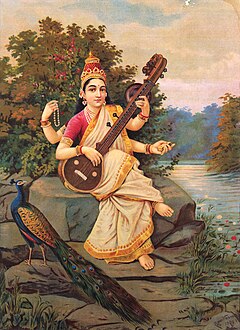
- This event has passed.
Sri Panchami
February 3

Sri Panchami, also known as Vasant Panchami or Saraswati Puja, is a Hindu festival dedicated to Goddess Saraswati, the deity of knowledge, wisdom, arts, music, and learning. The festival is celebrated on the fifth day (Panchami) of the Shukla Paksha (bright half) of the month of Magha in the Hindu lunisolar calendar, which generally falls in January or February.
Significance of Sri Panchami:
Goddess Saraswati: Goddess Saraswati is revered as the goddess of knowledge, arts, and culture. On this day, devotees pray for wisdom, intellect, and artistic abilities. Saraswati is depicted as a serene goddess holding a veena (a musical instrument), symbolizing the importance of music, and she is often shown seated on a lotus, symbolizing purity and enlightenment.
Vasant Ritu (Spring Season): The festival marks the arrival of Vasant (spring), which is considered a season of new beginnings, growth, and blossoming. Vasant Panchami celebrates the renewal of life and nature, and it’s seen as an auspicious time to initiate new ventures, especially in learning and creativity.
Association with Knowledge: Saraswati Puja on Sri Panchami is especially significant for students, artists, and those seeking to enhance their intellectual pursuits. Schools, colleges, and universities often hold special prayers and worship on this day to seek blessings for success in education and creative endeavors.
Rituals and Observances of Sri Panchami (Vasant Panchami):
Saraswati Puja:
Devotees worship Goddess Saraswati by setting up her idol or a picture in their homes, schools, or temples.
The idol is adorned with yellow clothes, and flowers (particularly marigolds), fruits, and sweets are offered.
Vedic chants and mantras are recited, especially the Saraswati Vandana (“ॐ सरस्वति महायोगिनि” or “Om Saraswati Mahayogini”).
Yellow is a prominent color associated with the festival, symbolizing prosperity, wisdom, and the onset of spring. Devotees often wear yellow clothes or decorate their homes with yellow flowers.
Books and Instruments Worship:
On this day, students, teachers, and artists keep their books, musical instruments, and other tools of learning or creativity near the idol of Goddess Saraswati for blessings. It is customary not to use these objects on this day but to place them at the feet of the goddess to receive her divine grace.
Many students place their pens, books, and instruments in front of the goddess and offer prayers for knowledge and success.
Fasting and Offerings:
Devotees may observe a fast on Sri Panchami, abstaining from food or consuming only fruits and light vegetarian food. The fast is usually done in devotion to the goddess, seeking her blessings for wisdom and knowledge.
Prayers and hymns like Saraswati Ashtakshara Mantra are recited for gaining wisdom.
Kite Flying (In Some Regions): In parts of North India, especially in Punjab and Uttar Pradesh, kite flying is a traditional activity on Vasant Panchami. This is part of the celebration of spring, symbolizing freedom, joy, and the welcoming of the season’s new life.
New Beginnings: As Vasant Panchami is associated with new beginnings and growth, people often start new ventures or begin studies, especially in fields like music, literature, and arts. Some families even begin learning new crafts or start new business projects.
Traditional Foods:
Kesar (saffron) and rice are commonly used in food offerings as saffron represents purity and enlightenment.
In Bengal and other Eastern parts of India, ‘khichuri’ (a savory rice and lentil dish) and ‘payesh’ (a type of rice pudding) are traditionally prepared and offered to Goddess Saraswati.
Sweets made of milk, especially those flavored with saffron, are common during the festival.
Regional Celebrations of Sri Panchami:
Bengal and Eastern India:
Saraswati Puja is particularly grand in Bengal and other eastern states, where it is one of the most important festivals. It is celebrated in homes, schools, and public spaces with elaborate decorations, prayers, and cultural performances.
In Kolkata, the festival is marked by grand processions and the installation of Saraswati idols in pandals. Students often celebrate by offering prayers for success in exams and artistic endeavors.
North India:
In North India, Vasant Panchami is often celebrated with fairs, music, dance, and cultural events. The festival heralds the arrival of spring and is a time for joy, renewal, and devotion to the goddess of wisdom.
Maharashtra and Gujarat:
In Maharashtra and Gujarat, Vasant Panchami is often associated with kite flying as the arrival of spring is celebrated with the flying of colorful kites. People also take part in communal festivities, singing traditional songs and participating in processions.
Conclusion:
Sri Panchami (Vasant Panchami) is a festival that celebrates knowledge, wisdom, and the arrival of the spring season. It is a time to honor Goddess Saraswati, the divine embodiment of learning and creativity. The rituals of worship, fasting, and prayer aim to invoke her blessings for success in education, the arts, and intellectual endeavors. For many Hindus, it is a day to start new learning activities, seek knowledge, and reflect on the importance of wisdom in daily life. The festival also marks the joyous arrival of spring, bringing with it a sense of renewal and prosperity.
